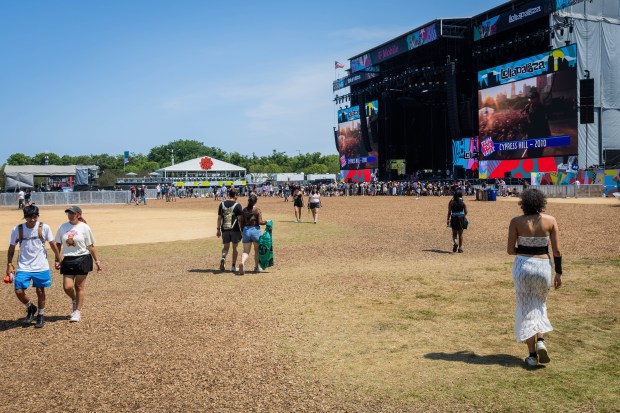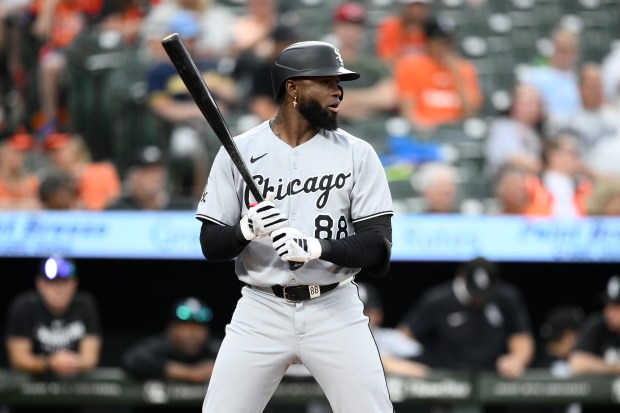After the conclusion of Grant Park’s 20th Lollapalooza, the festival name still hung in red bubble letters Monday morning above Ida B. Wells Drive. Security guards lined the path to Buckingham Fountain and traffic patrols stood in the middle of major intersections, directing traffic around road closures.
Some neighbors say they are unhappy with the increase in private events that limit access to the public park during the prime summer months.
Downtown will be affected by Lollapalooza-related closures for 26 days this year, according to the Chicago Park District. The four-day music festival, plus the addition of NASCAR’s Grant Park 165 street race last year and Sueños Music Festival in 2022, will make varying sections of Grant Park and surrounding streets inaccessible to the public for over 70 days from May 15 to Aug. 11.
“It’s a public park? I thought it was an event space,” said Owen Davey sarcastically on Saturday. The 51-year-old, who lives across the street from Grant Park, was cooling down after a run along its outskirts, which were heavily barricaded as Lollapalooza was in full swing.
Ticketed festivals such as Lollapalooza bring money to the city through revenue-sharing contracts. Last year, the Park District was paid a record-setting $9.6 million in fees to use Grant Park for the festival. But, these high-trafficked private events also limit the public’s ability to use the downtown park colloquially known as “Chicago’s front yard,” disrupt residents’ commutes and wear down infrastructure.
“The proliferation of private events already squeezes the public out of the park more days than not during Chicago’s precious summer months,” said Gin Kilgore, interim executive director of the nonprofit Friends of the Parks.
The volunteer-run Grant Park Advisory Council walked through the park with Lollapalooza organizer C3 Presents the day before the festival started to ensure necessary precautions were taken to minimize the festival’s footprint. The council’s goal is to get the park back to the public in its original state, as soon as possible.
Mulch was delivered to Lower Hutchinson Field during the walkthrough, said Jim Wales, advisory council vice president. This was not required, but C3 Presents saw rain in the forecast and made the prudent move.
Staff from Missouri-based event cleaning company VenueSmart were also sweeping trash from the roads and fields throughout the weekend.
“Lollapalooza has really been extremely eager to work with us,” Wales said. “They’ve clearly demonstrated a concern about using the park in a manner that minimizes a negative impact.”
Ultimately, C3 Presents is responsible for cleanup and any post-festival damage repairs. An independent landscaping firm evaluates the park before and after the festival and bills the organizer directly for the cost of damages.
Last year, C3 Presents paid just shy of $400,000 for park restoration, including sod, mulch cleanup and irrigation. One of the costliest years was 2011, when the final day was hit by a heavy rainstorm. The bill exceeded $1 million after festgoers began rolling in mud and throwing clumps of grass at one another.
C3 Presents did not respond to requests for comment.
“Although event producers cover the cost, they can’t pay back the time needed for repairs that further limit access to the park, especially when big summer rains turn fields to mud pits,” Kilgore said.
Except for some drizzle Thursday morning and a brief storm Thursday evening, the rain stayed away this year. But, sections of the park are still scheduled to be closed until Sunday, a week after the festival ended. Setup began July 17, 15 days before the festival kicked off.
“I would love to have better access to the park,” said Davey, the 51-year-old South Loop resident. “I used to live in New York City, and I did get to use Central Park all the time. You definitely don’t get to use Grant Park the same way because of all the events.”
Frustration about park access has grown since the NASCAR street race was added to the summer schedule last year. The public park hosted live music, grandstands and vendors over the Fourth of July weekend this year and last. Entry was ticketed.
“There seems to be a lack of planning by the city in the Loop area for all these events. Now it’s not just Lollapalooza, it’s also NASCAR,” said Peg Quinn, 64, as she rolled her bike past Lollapalooza, weaving between festgoers and pedicabs. She has lived near the Museum Campus for 17 years.
The Latin music festival Sueños has also occupied Grant Park every Memorial Day weekend since 2022.
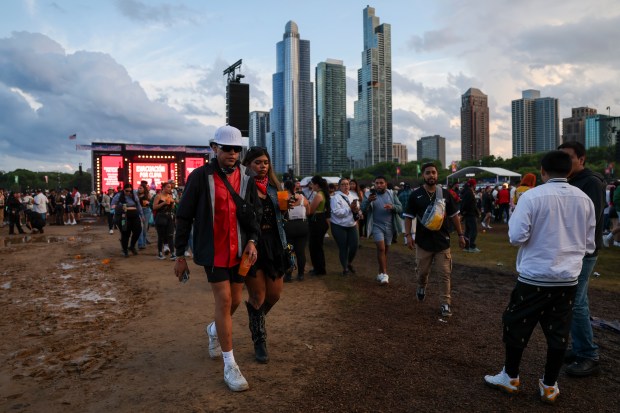
Overall, Lollapalooza, NASCAR and Sueños will make sections of the park inaccessible for over 10 weeks this summer, according to Park District releases.
NASCAR also displaced Taste of Chicago, a food festival featuring local vendors, from a prime summer weekend to September.
“We’ve replaced a homegrown celebration of local culinary geniuses that brought people to Grant Park with these other events that actually bring in a lot of out-of-towners and completely block off the park to people who live in Chicago,” Kilgore said.
Wales described the addition of NASCAR as a “tipping point” and said the city has a responsibility to ensure private events don’t affect livability for the tens of thousands of people who live near Grant Park.
More than park usage, however, residents are frustrated by the impositions frequent events put on their daily commutes.
“It sucks. I’ve been here long enough to know I’m not driving anywhere. No one is coming to see me. So, I just walk everywhere,” said Greg Millian, 57, who was strolling back from a boating trip Saturday afternoon, fishing rod in hand.
He enjoys cutting through Grant Park to get to work, but that hasn’t been possible recently.
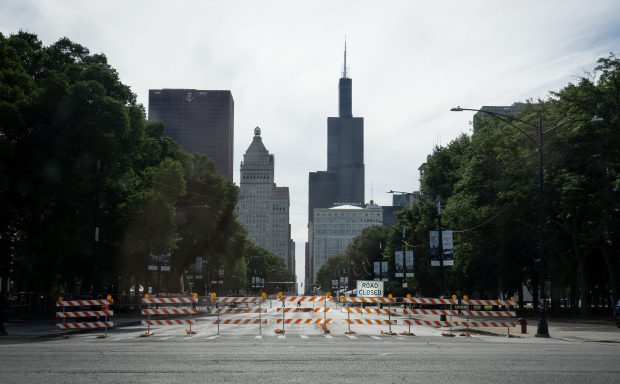
However, Millian says the extra steps are healthy and acknowledges that events such as Lollapalooza are a “huge moneymaker,“ specifically citing hotel and restaurant revenues. “Hopefully it trickles down to some other things that help the city out,” he said.
Last year, Lollapalooza generated $422 million for Chicago’s local economy, according to a report commissioned by the festival organizer. This includes the $9.6 million paid to the Park District.
But, some of Millian’s neighbors are less patient.
“I’m disappointed. It feels like they’re selling the city out for revenue they need at all costs,” Quinn said. She has struggled to commute to her office a mile and a half from her home in Museum Campus for much of the summer.
The revenue the city collects from events such as Lollapalooza, NASCAR and Sueños — entirely separate from the damage fees — goes to the Park District’s general fund, which supports all the city’s parks and associated programming.
The Grant Park Advisory Council, however, would like some of this money to go directly to Grant Park.
The park is facing damages that are difficult to attribute to any one event, especially as events get closer together, according to Wales. Teardown for NASCAR and setup for Lollapalooza were back-to-back this year.
“To have these events and not come to the understanding that there’s going to be a negative impact on the infrastructure of a park is just foolish,” he said. He’s particularly concerned that the sidewalks throughout the park are cracking because heavy trucks are constantly driving over them.
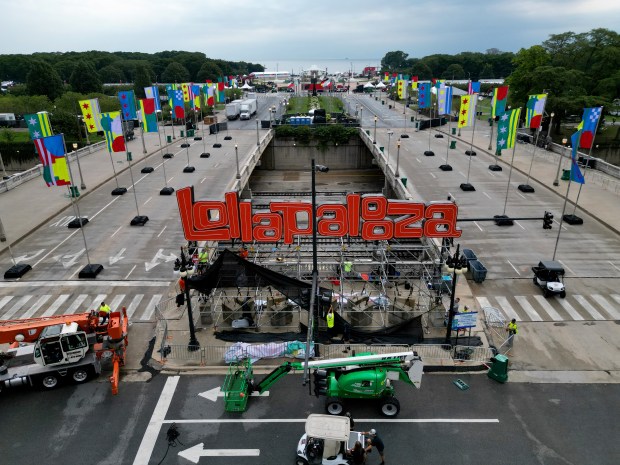
The Park District does have a Park Enhancement Fund, which reinvests a percentage of revenue from multiday-permitted events back into the host park. But, it does not apply to events with multiyear contracts such as Lollapalooza, NASCAR and Sueños.
Separately, C3 Presents, which organizes Lollapalooza and collaborates on Sueños, donated $500,000 for pickleball courts added to Grant Park in September.
The courts are expected to reopen Tuesday at 6 a.m., a relatively short turnaround time the Grant Park advisory council advocated for this year.


